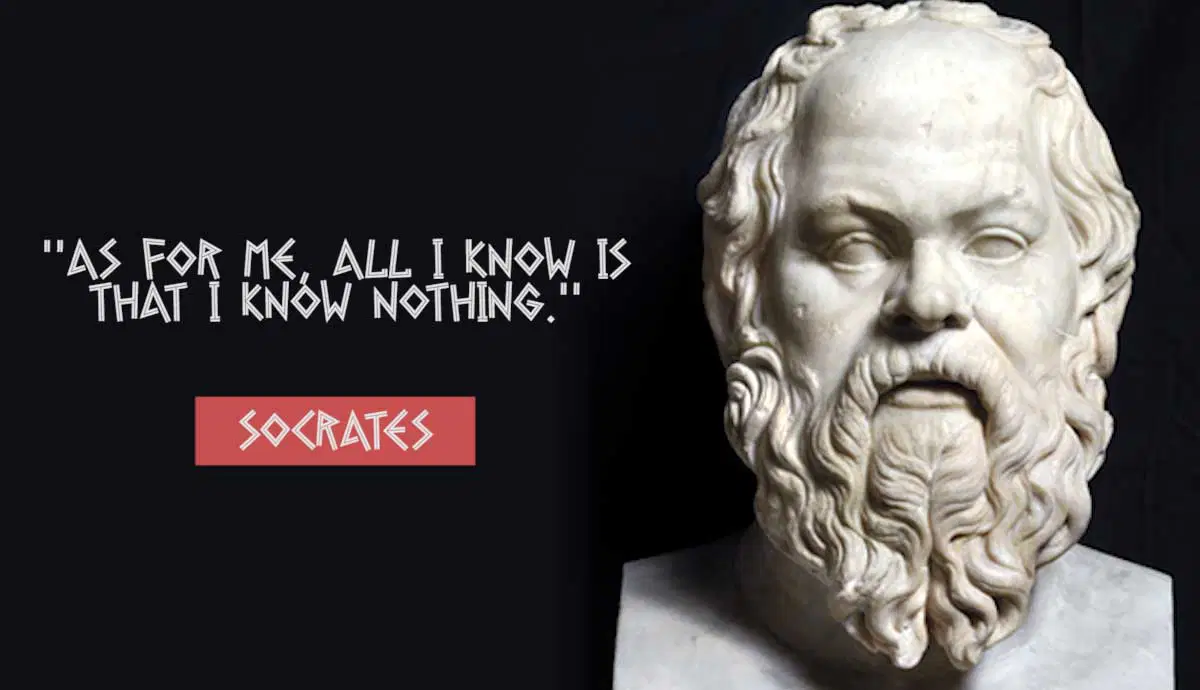
Socrates is one of the most famous and influential philosophers in history. Yet, he is best known for his statement, “all I know is that I know nothing.” Of course, this phrase will not mislead anyone because everyone knows that Socrates was a sage. More precisely, he was not a sage but a philosopher – “he who loves wisdom”. Was Socrates simply asking for the praise of his listeners by uttering this obviously false phrase?
What did Socrates mean by saying, “all I know is that I know nothing”? And why is this phrase so important? In this article, we will take a look at Socrates’ life and work and explore what made him one of the most important thinkers of all time.
Who Was Socrates, the Author of “All I Know Is That I Know Nothing”?

Socrates is possibly the greatest philosopher of antiquity. His students were Plato, Alcibiades, Xenophon, and Euclid. The teachings of Socrates marked a new stage in the development of ancient philosophy, one that shifted its focus from nature and the world onto man and spiritual values.
He was born on Farhelion 6, an “unclean” day that set his destiny. Socrates became a voluntary guardian of Athenian society. The philosopher would later serve his public roles with zeal but without fanaticism, and he paid for his beliefs, honesty, and steadfastness with his life.
The great thinker and philosopher Socrates was born in 470-469 BC in Athens, Greece. He came from a family of artisans, with his father being a sculptor and his mother working as a midwife. Socrates had an older brother who inherited the majority of their parent’s wealth.
Socrates lived as a poor man. Still, when he went to war in Sparta as a heavily armed warrior wearing an expensive uniform, he demonstrated that his father was a wealthy citizen. Socrates exhibited courage on the battlefield three times, most notably when he saved his commander Alcibiades from death.
Socrates studied with Damon and Conon, Zeno, Anaxagoras, and Archelaus in his youth, learning from other great minds of that time. He left no written records of his wisdom or philosophy behind. What we know about him today comes only from the memoirs of students, contemporaries, and followers like Plato and Aristotle.
Socrates’ Teachings and Philosophical Views

Socrates never wrote down his thoughts, because he believed that words lost their meaning and killed memory when they were written. He preferred to search for the truth through dialogue, instead. Socratic philosophy is based on the concepts of ethics, goodness, and virtue. According to Socrates, knowledge, courage, and honesty are related to these concepts.
Crucially, Socrates argued that knowledge is a virtue. Without understanding the true nature of things, it’s impossible to do good deeds, be brave, or act justly. So only through knowledge can we achieve virtuosity because it allows us to be aware of our actions.
Socrates saw the main task of his philosophy in the knowledge of himself and others. Therefore, the saying “know thyself” inscribed in the Delphic temple was his motto.
Socrates conducted his research in the form of conversations, having developed his own special method of “Socratic” dialectics. Socrates did not expound his philosophy systematically (in an “acroamatic” form) but questioned his interlocutor and forced them to do some work themselves.
At the same time, Socrates often pretended to be ignorant at first (this is often referred to as Socratic irony: “all I know is that I know nothing”), and then, having brought his interlocutor to absurd conclusions with skillful questions (reductio ad absurdum), he would convince them to reassess their assumptions and solve the problem philosophically.
This method prompted the interlocutors’ and listeners’ interest and active work of thought. Socrates compared his approach with his mother’s craft and said he simply helped people give birth to new ideas (maieutics).
The philosopher asked, pushing the interlocutor to new thoughts and formulations. From general subjects, he moved on to the definition of specific concepts: what are courage, love, and kindness? What is justice? What is the good?
“All I Know Is That I Know Nothing”

One of Socrates’ most famous quotes is, “all I know is that I know nothing.” This quote has become famously associated with Socrates and his philosophy.
So, where did this quote come from? It is a popular misconception that Socrates said this quote as a way of humble-bragging about his own wisdom. In reality, the quote is meant to be much more profound than that. What Socrates is really saying is that we can never truly know anything for certain. We can have beliefs and opinions, but we can never know for sure if they are correct. It is a deeply philosophical idea that thinkers have debated for centuries.
So why is this quote so important? It challenges us to think about our own beliefs and to question whether or not we really know anything at all. This quote forces us to examine our thought processes and be more critical of our beliefs. In a world where so many people are quick to accept things as facts without questioning them, this quote is a much-needed reminder that we should always be open to questioning our own beliefs.
The Delphic Oracle on the Wisdom of Socrates

Socrates went a long way in life before he developed his dialogical way of self-knowledge. Already in his youth, he loved thoughtful contemplation. In Plato’s Symposium, Alcibiades tells that once, during the siege of Potidaea, Socrates stood in thought, not moving from his place, for a whole day.
However, Socrates supposedly learned about his wisdom by accident. It happened when one of his admirers asked the oracle “Is there anyone wiser than Socrates?” The Delphic oracle answered “No.” After that, Socrates began communicating with those he considered smarter than himself and found that their wisdom was imaginary. More than two thousand years have passed since then, but Socrates is still considered one of the wisest people who ever lived.
It was clear that the opinion of the Delphic oracle, which enjoyed pan-Hellenic influence, would soon receive wide publicity. The oracle’s choice in favor of Socrates was tantamount to divine approval of his position. By saying, “all I know is that I know nothing,” Socrates saw that the path of wisdom is the path of seeking truth. And this search is endless. Thus, the path of wisdom is the path of an endless search for truth. The more the boundaries of human knowledge expand, the more the infinity of the search for further knowledge is comprehended.
Two Paradoxical Meanings of Socrates’ Phrase

The meaning of Socrates’ reflections in the phrase “all I know is that I know nothing” consisted of two paradoxical things. Firstly, Socrates doubted his own wisdom’s superiority over other people’s wisdom. Secondly, he wanted but could not doubt the truth of the words of Apollo, the god of Delphi.
To resolve the paradox, Socrates began his research with a philosophical survey of citizens and foreigners. He wanted to know the wisest sage. He desired to refute the oracle’s prophecy with the statement: behold, a man wiser than Socrates has been found.
So, Socrates talked with politicians, poets, artists, and artisans. And he discovered an interesting fact: any of them, having achieved knowledge and success in a particular area, strengthened in the opinion that he was now wise in all things. But, at the same time, no one knew about the essence of things in the world: neither Socrates nor other people.
And yet, Socrates had the only knowledge that was inaccessible to other people. He realized that he did not know anything, and other people did not know their own limits and did not want to know that they only seemed to be wise. So, Socrates saw the limitations of his knowledge, showing cognitive modesty. And other people, because of their hurt pride, kindled hatred towards him.
Socrates stunned and stung other people with his skeptical and ironic perception of human wisdom. People thought that Socrates was well versed in what he accused others of. Finally, however, Socrates realized that the divine is the most knowledgeable.
The Oracle did not mean to refer to Socrates in the prophecy, but only used his name as an example. The god, in his prophecy, wanted to say: the wise man is one who, like Socrates, realizes that human wisdom is cheap or worth nothing at all.
Therefore, with the phrase “all I know is that I know nothing,” Socrates expressed that there is human (limited) and divine (limitless) wisdom. In addition, the philosopher believed that a person, the wisest of all after a god, should not think they know what they do not know.
Is the Statement “All I Know Is That I Know Nothing” Contradictory?

Scholars have debated the coherence of Socrates’ famous statement, “all I know is that I know nothing,” for centuries. Some people interpret his words to mean that he was admitting his own ignorance. Others argue that Socrates was actually saying that he deeply understood the human condition and that true knowledge comes from acknowledging our own limitations.
So, which interpretation is correct? It’s difficult to say for sure, but there are some things we can consider to understand better what Socrates might have meant.
First of all, it’s important to remember the historical context in which Socrates lived. He was born in Athens in the 4th century BCE, during a time of great political and social turmoil. Moreover, Socrates himself was no stranger to controversy; he was famously tried and executed for his allegedly “corrupting” influence on the youth of Athens.
In light of all this, it’s perhaps not surprising that Socrates would be skeptical of any claims to absolute knowledge. After all, if even the wisest among us can make mistakes, how can we be sure that anything we think we know is truly true?
It’s also worth considering the fact that Socrates was a man of great intellect and wisdom. He spent his life questioning everything and everyone, including himself. So, it’s possible that his famous statement was simply a reflection of his own self-awareness and humble view of human knowledge.
What can we conclude from all this? It’s difficult to say for sure what Socrates meant when he said, “all I know is that I know nothing.” But it seems reasonable to believe that he was either admitting his ignorance or acknowledging human knowledge’s fallibility. Either way, his words continue to challenge and inspire us centuries later.
So, What Did Socrates Really Mean by “All I Know is That I Know Nothing”?

One probable interpretation is that he was simply acknowledging his own fallibility and lack of omniscience. After all, even the wisest person can’t know everything.
Another way to look at this statement is to see it as a recognition of the inherent limits of human knowledge. We can never really know anything for sure, and even our most firmly held beliefs could be wrong. Of course, this doesn’t mean we should give up trying to learn and understand the world around us, but it reminds us that we should always be open to new information and perspectives.
At the end of the day, there is no definitive answer to what Socrates meant by his famous statement. But whether you interpret it as a humble acknowledgment of fallibility or a profound claim about the inherent limits of human knowledge, there is no doubt that it contains a great deal of wisdom.










